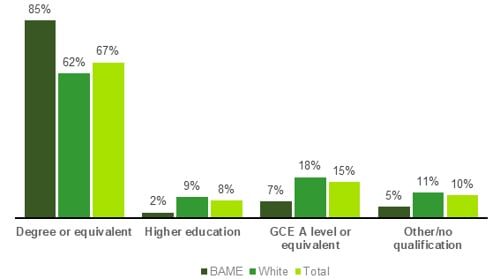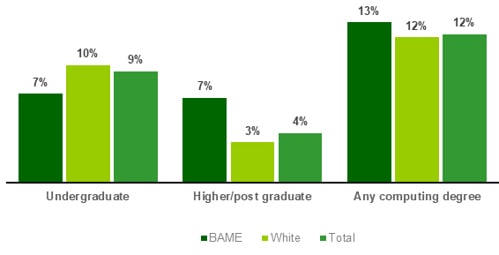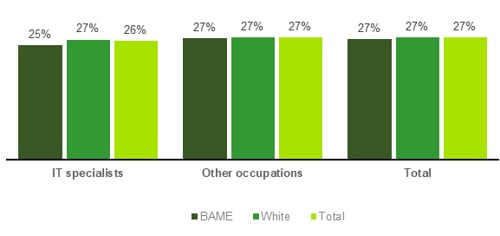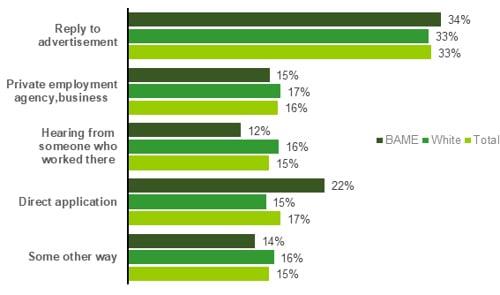Skills
Qualifications held
IT specialists are more highly qualified than other UK workers, and in 2023, three-quarters (75%) were thought to hold some form of higher-level qualification, compared with five in ten workers as a whole (51%).
This said, BAME IT specialists were found to be even more highly qualified than others in IT positions with almost nine in ten (88%) holding some form of HE level qualification.
Level of educational attainment amongst IT specialists (2023)

Source: Analysis of ONS Quarterly Labour Force Survey by BCS
BAME IT specialists are also marginally more likely to hold a degree in an IT-related discipline than others working in such occupations, and in 2023 approximately 13% were thought to have either a higher or undergraduate computing degree compared with 12% of IT specialists from white ethnic groups.
IT specialists holding computing degrees (2023)

Source: Analysis of ONS Quarterly Labour Force Survey by BCS
Skills development
Despite the arguably high skill/knowledge requirements associated with their work, IT specialists as a whole in the UK appear marginally less likely than other workers to receive job-related education/training and, throughout 2023, on average 26% of IT specialists stated that they had received some form of job-related education/training in the previous 13 weeks compared with 27% of workers as a whole.
The incidence of job-related education/training was slightly lower amongst BAME IT specialists in 2023 at 25%.
Job-related education / training in the past 13 weeks (2023)

Source: Analysis of ONS Quarterly Labour Force Survey by BCS
Skills sourcing
As with other UK employees, the most common identifiable means of IT specialists[4] securing a job (where stated) during the 2019-23 period was by ‘replying to an advertisement’ (33% of those that had been with their employer for less than one year stating they had secured work in this manner), and this was true for both BAME/white ethnic groups (33% in each case).
The likelihood of IT specialists finding work via two other common routes i.e. contacts and direct application was instead very different i.e. whilst 16% of white IT specialists found work via someone already in-post, only 12% of BAME specialists stated this to be the case and, whilst 22% of BAME IT specialists found work via direct application, this was only true for 15% of those from white ethnic groups.
Means of finding work amongst IT specialists (2019-2023)

Source: Analysis of ONS Quarterly Labour Force Survey by BCS
[4] Employees / people on government schemes who have been with their current employer for less than one year/12 months prior to being interviewed for the LFS.








